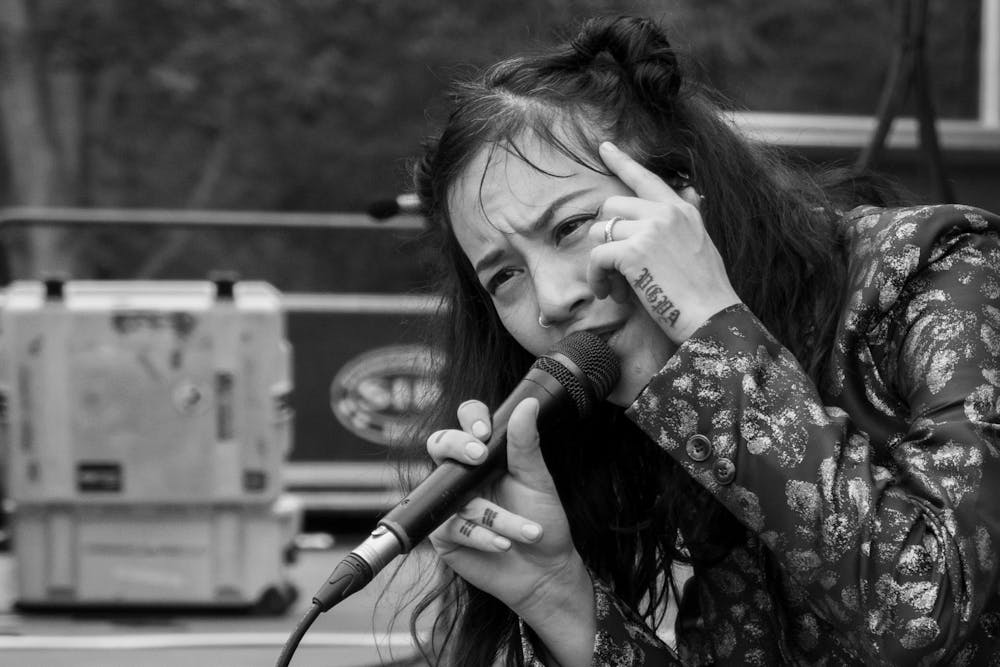Crying in H Mart is more than just a story of grief and family—it's also a love letter to Michelle Zauner’s mother and her mother country, South Korea. Zauner, known fondly among fans of indie rock by the stage name “Japanese Breakfast,” opens her first memoir, Crying in H Mart, with a simple declaration: “Ever since my mom died, I cry in H Mart.”
Zauner begins by explaining what H Mart is to readers who may be unfamiliar with the Korean supermarket chain. For many Asian immigrants living in America, the sparsely located grocery store is both a welcome sight and a reminder of home. As a half–Korean, half–white child, Zauner’s memory of her mother, Chongmi, is inextricably tied to Korean food, which she paints a vivid picture of throughout her memoir. With anecdotes revolving around food, culture, love, and sacrifice, Zauner meticulously and honestly recounts her mom’s battle against cancer and the aftermath of the grief that overtook her following her passing.
Crying in H Mart often calls upon bright imagery so descriptive that I felt swept up in small details familiar to South Korean heritage. As a Korean–American myself, I could almost smell the tangy spice of home–fermented kimchi, and I could watch my shoes move across H Mart's white linoleum floors while walking past unending rows of Korean food. Zauner’s ability to transport me into intimate moments in her own life not only compounded my understanding of the grief she experienced, but also allowed Zauner to provide moments of unexpected levity throughout her memoir.
Zauner’s biracial upbringing, especially in a mostly white area of Oregon, also intertwines with her complex childhood as she explores her own identity. She tells her mother how difficult it is to grow up as the only Korean girl in a school full of white people, to which Chongmi responds that she’s not Korean—she’s American. At times, Zauner feels that her only connection to Korea is Chongmi; she’s not fluent in the language, and doesn’t totally fit in during her visits. But after losing her mother, Zauner returns to the part of Korean culture she is extraordinarily well–versed in: food. Every time she describes bubbling jjigae and the filling comfort of jatjuk, she strengthens her connection with her mother.
In many ways, Zauner’s memoir honors all Korean mothers by honoring the memory of her own. Korean traditions weave their way through Zauner’s childhood, and her visits to South Korea are dotted with cultural nods to their heritage. One theme in particular reappears throughout their lives: sacrifice, a common subject for most immigrant parents and their children.
During one of her early visits to South Korea, Zauner observes her grandmother and mother. Her grandmother peels fruit with a paring knife in one long motion, eating from the core so as to not waste any while her own daughter enjoys the pristinely cut slices. It’s a mundane moment, an observation made from a curious child who is realizing that her mom, too, has a mom, and that her mother was once a child just like her. And while Zauner’s writing is simply recognizing one simple snapshot in time, a woman cutting fruit, she encapsulates an act of love that transcends the need for words or more obvious demonstrations of sacrifice.
While Crying in H Mart is dedicated to Chongmi, their mother–daughter bond wasn't always smooth sailing, a fact that would weigh on Zauner during her mother's illness. Their relationship faced heavy strain during her teen years over differences in outlook and adolescent rebellion. Her emotional reunion with her mother is bittersweet, as she writes about their relationship throughout the years: a child clinging to her mother, pushing her away, and then returning, a grown woman, who once again embraces her relationship with her mother.
Layered under the complexities of cultural and generational differences, though, is unadulterated love. It’s heartbreaking that right when Zauner and her mother are recovering from the turbulence of Zauner’s teenage years, they receive a cancer diagnosis. The sudden and looming finality of their tragedy pushes Zauner to try and fit what should be years of memories, experiences, and healing into the time she has left with her mom.
Zauner writes plainly, but beautifully. Her experience writing music shines through in the lyricism of her deeply personal anecdotes. Crying in H Mart was the hardest book I had to read in a long time. I could see my own Korean mother reflected in the memory of her own, and at times was taken aback by how familiar some of the experiences she shared were to me. Zauner’s vulnerability is at once admirable and devastating.
An old photo of her mother graces the cover of Zauner’s 2016 album, Psychopomp, a creative project born from grief after her mom’s passing. Her mom reaches towards the camera, smiling, and within every track I can hear her influence. The titular interlude, “Psychopomp,” plays a recording from Chongmi after her cancer diagnosis. She comforts Zauner, saying, “Gwenchanta, gwenchanta. It's okay, sweetheart. Don't cry, honey. I love you.”
After her mother passed, Zauner wondered if she would ever be able to feel joy again. It felt wrong to experience pleasure after witnessing Chongmi’s battle against cancer and losing someone so pivotal in her life. But with the release of Japanese Breakfast’s latest album, Jubilee, Zauner triumphantly sings about joy. It could be considered a lush and radiant testament that life does go on after tragedy, but Jubilee doesn’t move on without Zauner’s mother. In fact, Zauner has immortalized her mother’s memory through songs both about grief and joy—and even though H Mart conjures up difficult memories, every time Zauner enjoys a traditional Korean dish, she’ll be honoring Chongmi.

